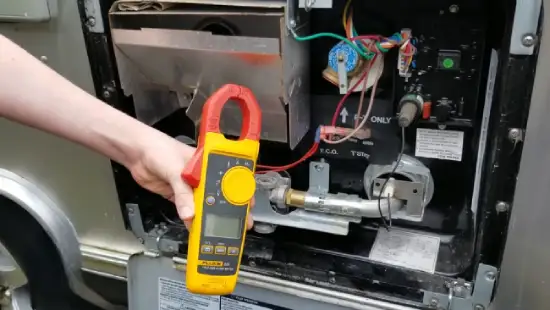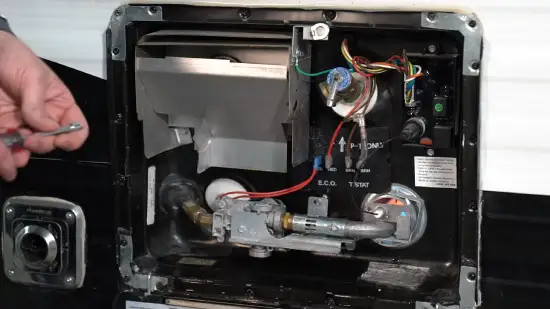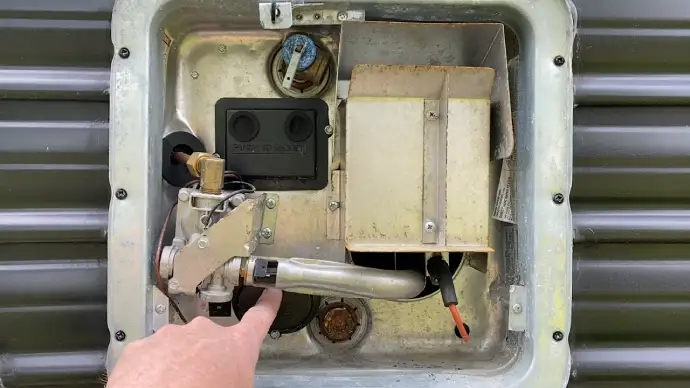Last Updated on December 24, 2023
As a discerning RV owner, you know the importance of monitoring your vehicle’s energy usage, especially regarding appliances like the water heater. This particular appliance can consume a significant amount of electricity, leading to energy-related issues during your travels if not appropriately managed.
Therefore, understanding how many amps an RV water heater use is crucial for efficient energy management and mitigating any potential electrical problems.
A number of factors must be considered when calculating the amperage draw of your RV water heater, including its type, voltage, heating capacity, energy efficiency features and more. On average, RV water heaters typically use 8 to 13 amps.
Let’s examine these factors and their impact on your RV’s energy consumption. We’ll also provide valuable insights and energy-saving tips to optimize your water heater’s amperage draw and maximize your RV’s energy consumption.
What Factors Influencing the Amperage Draw of an RV Water Heater?

When it comes to RV water heaters, there are several factors that can influence the amperage draw. Here are the key components to consider:
- No 01: Type of Water Heater
- No 02: Wattage Rating
- No 03: Voltage
- No 04: Model and Brand
- No 05: Heating Capacity
- No 06: Energy Efficiency Features
- No 07: Tankless vs. Tank-Type
- No 08: Operating Mode
- No 09: Country of Origin
No 01: Type of Water Heater
Propane/electric RV water heaters are a wise choice for those seeking efficient energy usage. They operate smoothly, with a lower amp draw compared to their electric-only counterparts. Propane is a highly efficient and dense fuel, resulting in quick and effective water heating.
Aside from that, when coupled with electricity, propane has the potential to decrease the energy necessary for water heating, resulting in a lower amperage draw.
No 02: Wattage Rating
When considering a water heater element for your RV, paying attention to its wattage rating is crucial. This rating affects not only the unit’s energy consumption but also its effectiveness in providing hot water.
Most RV water heaters are equipped with electric heating elements that typically range from 1,200 to 1,500 watts. This rating provides a quick and efficient supply of hot water, heating up to 6 gallons in less than an hour.
But, you should note that higher wattage elements draw more power, potentially overloading your RV’s electrical system and tripping the circuit breaker.
No 03: Voltage
Regarding RV water heaters, voltage is an important factor to consider. Most RV water heaters run on 120 volts. But, some are equipped with two 120-volt elements, providing a total of 240 volts.
High-end models may also have two elements of different wattages for more versatility in controlling the hot water temperature.
Remember that the electric water heater will use 120 or 240 volts AC, which can be converted from 12 volts DC via a converter.
No 04: Model and Brand
When searching for the perfect water heater model and brand for your RV, keep an eye out for hidden gems that can provide warmth on chilly nights. Amp requirements vary between different models and brands of RV water heaters, which is crucial to determine the specific electrical needs of your water heater.
Consult the manufacturer’s specifications to ensure that your chosen water heater meets the electrical requirements of your RV.
No 05: Heating Capacity
To ensure sufficient hot water while avoiding electrical issues, consider the heating capacity of your potential RV water heater. Heating capacity is measured in gallons per hour (GPH) and indicates how much water the heater can heat in an hour.
A higher capacity produces more hot water while also increasing the amp draw, which can affect your RV’s electrical system. You should find a balance between heating capacity and amp draw when choosing an RV water heater.
No 06: Energy Efficiency Features
Keep an eye out for extra insulation, which prevents heat loss and lowers the energy required to maintain a desired temperature. Along with this, some models have adjustable temperature settings, which can also save energy.
Remember that energy-saving features can affect a water heater’s overall amp draw. Water heaters with extra insulation may require more amps for the initial heat-up, but it will ultimately require fewer amps to maintain the temperature.
Water heaters with adjustable temperature settings may require fewer amps on a lower setting but more amps on a higher setting.
No 07: Tankless vs. Tank-Type
Tankless water heaters are known for their energy efficiency and durability, surpassing tank-type models in both aspects. They provide an instant supply of hot water, which is great for RV owners who hate waiting for the tank to heat up.
But, it’s essential to note that tankless models generally require higher amperage due to their on-demand heating mechanism, meaning that they consume more current than their counterparts.
Meanwhile, tank-type water heaters are a simpler and more obvious choice when compared to tankless models. They are also typically more affordable and require less maintenance than tankless models. Further, they take up more space and are less energy-efficient than their tankless counterparts.
No 08: Operating Mode
Your RV water heater’s amp draw varies depending on the operating mode, much like a chameleon changing its colors. Electric mode draws 08 to 13 amps but requires shore power or a generator.
The propane mode’s draw will vary from a single burner at 0.75 to 3 amps and up to 6 amps when both burners are operating.
If using a combination of electric and propane, the draw will depend on which mode is active. Both modes at the same time allow for faster heating but drain the battery quicker.
No 09: Country of Origin
Knowing the proper electrical standards for your location is crucial when selecting an RV water heater’s country of origin. Each country has different electrical requirements and specifications that can impact the performance of your water heater.
For example, RV water heaters manufactured in the United States may have different voltage and amperage ratings compared to those made in Europe or Asia.
To ensure compatibility with your electrical system and avoid safety hazards or damage, checking your country’s electrical standards and guidelines before purchasing an RV water heater is essential. Conduct thorough research to verify that your chosen water heater meets these requirements.
How to save energy with RV water heaters?

Consider using energy-saving tips and techniques to save on energy costs for your RV water heater. One of the easiest ways to save energy with perfect amps is to use low-flow showerheads, which can reduce hot water usage by up to 50%.
Also, washing laundry in cold water can save up to 90% of the energy used for washing clothes while also reducing wear and tear on fabrics.
Insulating your RV water heater is another way to save energy with required amps. This will help to keep heat from escaping, which means that the water will stay warmer for longer periods of time.
You can also adjust the temperature settings of your RV water heater to ensure that it’s using only what is necessary. Lastly, using energy-star-rated models can help you to save energy and money in the long term.
How many amps does a 10 gallon RV water heater use?
The amperage of an RV water heater can vary depending on the model. But, a 10 gallon RV water heater typically uses around 12.5 amps of power, assuming it’s a 120-volt, 1500-watt unit.
This means that when using your 10 gallon RV water heater, you should be mindful of how much power is being used in your RV overall. Be sure not to overload your electrical system, as this can cause damage and create safety hazards.
Also, you may want to consider using energy-saving techniques, such as turning off the heater when it’s not needed or using a timer to limit its use.
What implications of high-wattage appliance usage in an RV?
Be mindful of the potential dangers of overloading your RV’s electrical system by running multiple high-wattage appliances at once. This could lead to damage or even a safety hazard for you and your loved ones.
When multiple appliances are running on the same circuit, the electrical system can become overwhelmed and cause the circuit breaker to trip or even result in a fire.
Therefore, you should avoid operating multiple high-wattage appliances simultaneously on the same circuit.
If an RV water heater is running simultaneously with other high-wattage appliances, it can draw a significant amount of power from the electrical system. Only run one high-wattage appliance at a time and monitor each appliance’s amperage usage to avoid overloading the system.
Electricity Management for RVers: Understanding Your Water Heater’s Amp Usage and More
Understanding the amps your RV water heater uses is just a small piece of the puzzle when managing your energy usage. It’s crucial to consider other essential factors impacting its amperage draws, such as type, voltage, heating capacity, and energy efficiency features.
Overloading your RV’s electrical system can lead to dangerous safety hazards, so it’s essential to be mindful and adjust your appliance usage accordingly.
By taking these precautions, you can ensure a safe and comfortable RV experience, even in remote areas. Remember, it’s always better to prevent electrical issues than to fix them.



